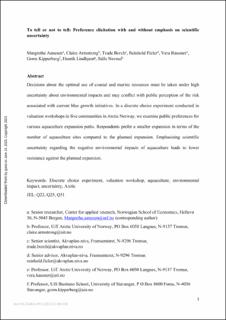| dc.contributor.author | Aanesen, Margrethe | |
| dc.contributor.author | Armstrong, Claire W. | |
| dc.contributor.author | Borch, Trude Kristin | |
| dc.contributor.author | Fieler, Reinhold | |
| dc.contributor.author | Hausner, Vera Helene | |
| dc.contributor.author | Kipperberg, Gorm | |
| dc.contributor.author | Lindhjem, Henrik | |
| dc.contributor.author | Navrud, Ståle | |
| dc.date.accessioned | 2023-07-21T08:53:37Z | |
| dc.date.available | 2023-07-21T08:53:37Z | |
| dc.date.created | 2023-01-28T19:23:34Z | |
| dc.date.issued | 2023 | |
| dc.identifier.issn | 0023-7639 | |
| dc.identifier.uri | https://hdl.handle.net/11250/3080674 | |
| dc.description.abstract | Decisions about the optimal use of coastal and marine resources must be taken under high uncertainty about environmental impacts and may conflict with public perception of the risk associated with current blue growth initiatives. In a discrete choice experiment conducted in valuation workshops in five communities in Arctic Norway, we examine public preferences for various aquaculture expansion paths. Respondents prefer a smaller expansion in terms of the number of aquaculture sites compared to the planned expansion. Emphasizing scientific uncertainty regarding the negative environmental impacts of aquaculture leads to lower resistance against the planned expansion. | |
| dc.description.abstract | To tell or not to tell: Preference elicitation with and without emphasis on scientific uncertainty | |
| dc.language.iso | eng | |
| dc.title | To tell or not to tell: Preference elicitation with and without emphasis on scientific uncertainty | |
| dc.title.alternative | To tell or not to tell: Preference elicitation with and without emphasis on scientific uncertainty | |
| dc.type | Peer reviewed | |
| dc.type | Journal article | |
| dc.description.version | acceptedVersion | |
| dc.source.journal | Land Economics | |
| dc.identifier.doi | 10.3368/le.99.3.021122-0011R | |
| dc.identifier.cristin | 2117273 | |
| cristin.ispublished | true | |
| cristin.fulltext | postprint | |
| cristin.qualitycode | 1 | |
